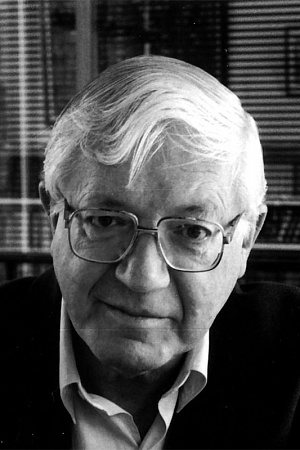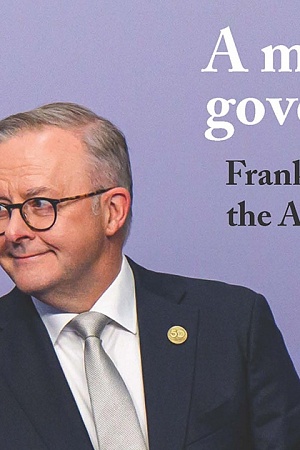Morag Fraser on Obama's presidency
Immediately after the mid-term elections in November, Barack Obama left for a long-planned G20 gathering in Seoul and for meetings with heads of government in the nation states of India, Indonesia, and Japan. Nothing remarkable, you think? Exactly what one expects a United States president to do? Not in America.
The right-wing blogosphere went berserk. Michele Bachmann (Republican, Minnesota, Tea Party Caucus member, and proponent of a ‘carbon is not harmful because it’s natural’ strand of climate-change denial) calculated the India leg as costing ‘American taxpayers’ two hundred million dollars a day. Bachmann’s figures were as creative as her science, but these are inventive times – Orwellian in their blithe disregard of evidence. (Economist Paul Krugman described the Republicans’ recent ‘Pledge to America’ solution to the US national debt as a ‘war on arithmetic’.)
Bachmann’s fellow conservatives, not all of whom would choose to be allied with her, fight the domestic cold war with ad hominem flair. William Kristol denounced Obama’s trip as vainglory: ‘Heaven help me. I’m starting to feel sorry for this vain, petty man.’
Heaven help me, this is the same William Kristol who ardently promoted that paragon of self-effacement, Sarah Palin. And while Kristol’s personal politics of race are not at issue, his insinuating condescension goes down well with those Americans who still can’t stomach the fact that their president is both black and smart – and, on occasion, self-deprecating. Did Kristol not watch Obama’s press conference after the Democrats’ rout in Congress? ‘Shellacking’ was Obama’s word, a linguistic gift to the press corps and now the indicative judgement on the November elections. (Compare and contrast Sarah Palin’s ‘refudiate’, as in ‘Peaceful Muslims please refudiate’ [the Ground Zero Mosque], an unintended coupling – by refute out of repudiate – that has been named the Oxford American Dictionary’s Word of the Year.)
More disturbing than Tea Party triumphalism is the prevailing mood of disenchantment. America’s dark Prince Charming hasn’t delivered another Camelot. Off with his head. Serious scholars may demur. Thus, Harvard historian James T. Kloppenberg: ‘So incoherent is American public debate that Obama’s critics simultaneously blame him for an economic situation he did nothing to cause and oppose larger infusions of money into the economy through much greater government spending, the only option that might directly address the problem’ (Reading Obama: Dreams, Hope and the American Political Tradition,Princeton University Press, 2011). But the columnists who basked in Obama’s victory now relentlessly dissect his shortcomings. Frank Rich, one of the New York Times’s fairest and most astute columnists, bemoaned the timing of the president’s India visit thus: ‘Nothing says “outsourcing” to the American public more succinctly than India. But the White House didn’t figure this out until the eve of Obama’s Friday [5 November] departure, when it hastily rebranded his trip as a jobs mission.’
‘More disturbing than Tea Party triumphalism is the prevailing mood of disenchantment’
Fair comment on White House mishandling of what they call ‘the optics’, but dig deeper and ask who is actually doing the outsourcing. Are the corporate heads who send jobs offshore in Gadarene compliance with conventional economic theory not members of the ‘American public’? The headline to the column caught the nation’s insular mood exactly: ‘Barack Obama, Phone Home.’
Only about twenty-two per cent of Americans own a passport.
International relations played no part in what passed for election debate. That’s not surprising – the mid-terms are domestic affairs. But war and the waste of so many young American lives in Iraq and now Afghanistan – that, you might have thought, would rate as a domestic issue. It didn’t. In the media static of America’s takeout politics, war is off limits. Go read about it in books (Bob Woodward’s Obama’s Wars [Simon & Schuster, 2010] reveals how much energy the president must expend on the two conflicts he inherited) or ‘élite’ magazines and newspapers, if you will, but don’t bring it up at dinner because right now ‘the American people’ are focused on jobs and the deficit. And don’t ask whether military spending adds to the deficit because that’s tantamount to abusing the flag.
Energy policy? If you listen through the cracks, you can hear many promising developments, both at a government, industrial, and entrepreneurial level. The American car industry has got the message – not that it had much choice. Alternative energy is all the go in labs and research facilities. But front of mind for the American people or for politicians in states with oil interests? Hardly. (Congresswoman Bachmann is strenuously pro-choice on incandescent light bulbs.) Domestic energy waste remains breathtaking. Here in seriously broke New Jersey, we sneeze through leaf blower season and freeze in movie theatre air conditioning. We dodge around SUVs lined up outside the local school and watch, bemused, as one child is chauffeured home by mom in a vehicle large enough for a tutorial. The paraphernalia of energy consumption is everywhere. Our small apartment is furnished with a microwave, a stove, and a grill. In the cavernous basement, we’ve set up a clotheshorse and ropes to take wet sheets. I think, ruefully, that American poetry and American children will never know the likes of Judith Wright’s and Rosemary Dobson’s hymns to an elemental domestic pleasure.
We meet as though in the formal steps of a dance
To fold the sheets together, put them to air
In wind, in sun over bushes, or by the fire.
(Rosemary Dobson)
At the Museum of Modern Art, the banner exhibition for Fall is Abstract Expressionist New York. The works – by Pollock, Rothko, David Smith, de Kooning et al. – offer some residual sense of the manic energy of mid-twentieth-century painting and sculpture, but there is a melancholy ‘once-were-warriors’ feel about the display, and not a little self-congratulation.
On health care the country is even more backward-looking – cubist-surreal in its fragmentation and distortion of views. Something resembling the historic bills passed during Obama’s first year in office turns up in public discourse, but the bits don’t fit together. You have to do your own homework to figure out that the legislation will reduce the deficit as well as guaranteeing health care for many millions of Americans previously uninsured. The Republicans, determined upon repeal, evince no interest in coherent analysis or critique. The insurers, lobbyists, drug companies, and others who benefited under the old régime are hell-bent on returning to what they had before – privileged access and profit. Meanwhile, the public are encouraged to think they have been robbed. Surrealer and surrealer. John Boehner, incoming House Speaker and coy darling of the corporations and lobbyists, recently declared the American system ‘the best health care system in the world’. As one columnist quipped, ‘He must have been having an out-of-country experience.’
Official statistics rank the USA as forty-ninth in life expectancy.
What shocks an Australian is the subtext to Boehner’s counter-factual patriotic flourish. American health care may be the best in the world (it’s certainly the most expensive) – for a privileged few. If you are cashed up and can choose – still the mantra term – the vaunted expertise of this cancer clinic, or that cardiac unit, or those best doctors in that best hospital in Massachusetts, you’ll be looked after. But the poor Joes who are tantalised by stupendously costly and glossy ads or television blandishments that promise limitless potency or super clinics to fix your bung knee or drug régimes to ease your rheumatoid arthritis don’t have too many choices. Heaven help the ones who have lost their health care along with their jobs and homes.
America is a treasure trove for ironists. I clip the Tiffany and Cartier ads (today’s watch ‘starting at $6500’) from page three of the Times and paste them onto postcards home alongside my favourite bit of NYT sanctimony, the space-filler dinkus that reads: ‘Remember the neediest.’
That’s just for starters. Every day yields a full meal of paradox and contradiction, both latent in the bones of the Republic. In good times, my gleanings would be just funny-bone tweaking. But these are Dunciad times, times to keep your elbows close to your sides. America needs an Alexander Pope to chronicle the grotesqueries, the irrationalities, and the irreconcilables. But his like is nowhere to be heard.
Returning Republicans and Tea Partiers trumpet their Congressional ‘mandate’ from ‘the American people’.
Less than fifty per cent of eligible Americans voted.
The Republican majority in the House vows to cut the deficit and ‘get the country back on track’. Simultaneously, it insists on an extension of the Bush tax cuts to everyone – billionaires included.
Warren Buffett writes a public letter to Uncle Sam saying that he did the right thing with the bailout, saved the country from meltdown, the world from chaos. ‘Overall, your actions were remarkably effective.’ Where is the consensus among capitalists? Does ‘the American public’ no longer love a winner?
George W. Bush hawks his new memoirs around the country with bandy-legged insouciance. His popularity rating has gone up since he left office.
The US Supreme Court, in its Citizens United ruling, decides (five to four) that government may not ban political spending by corporations in candidate elections. So, in the country that prizes transparency and flays other countries for lack of it, big money can now inject big bucks to help political candidates along – without disclosure and with impunity. Virginia Thomas, wife of Supreme Court Justice Clarence Thomas, can accept donations from unnamed donors to her advocacy group, Liberty Central, and rally on Capitol Hill in a Lady Liberty crown to condemn the government’s ‘hard left’ agenda. Conflict of interest? Nope. Free speech. Imagine the reaction if Justice Michael Kirby’s partner had installed himself on the steps of Parliament House in Canberra wearing a kangaroo and emu coronet and calling for a change of government.
My regression into irony is just a way of deflecting anxiety. I have grown to love this country, and the prospect of failure for its great experiment in democracy is unbearable. So is the possibility that all the good will, wit, bravery, and decency of the people I’ve lived among might be squandered. The recent elections were a mixed indicator: there was resilience and some cussed sense in the voters’ rejection of extreme candidates. There is still a possibility that the Democrats might stop procrastinating and that some Republicans might concentrate more on governing than on removing a president. But there are no guarantees.
Cornel West, Princeton philosopher and social critic, remarked recently that Abraham Lincoln had a tragic sensibility, a desirable trait in a leader, but one that today’s politicians lack. About Obama, I disagree. Reading, watching, and listening to this young, ambitious man, this first black American president of a United States forged in blood on Lincoln’s watch, I’ve seen intimations, an emergent tragic awareness in his words, his demeanour.
But heaven help us all if he ever has to feel its full force.















Leave a comment
If you are an ABR subscriber, you will need to sign in to post a comment.
If you have forgotten your sign in details, or if you receive an error message when trying to submit your comment, please email your comment (and the name of the article to which it relates) to ABR Comments. We will review your comment and, subject to approval, we will post it under your name.
Please note that all comments must be approved by ABR and comply with our Terms & Conditions.